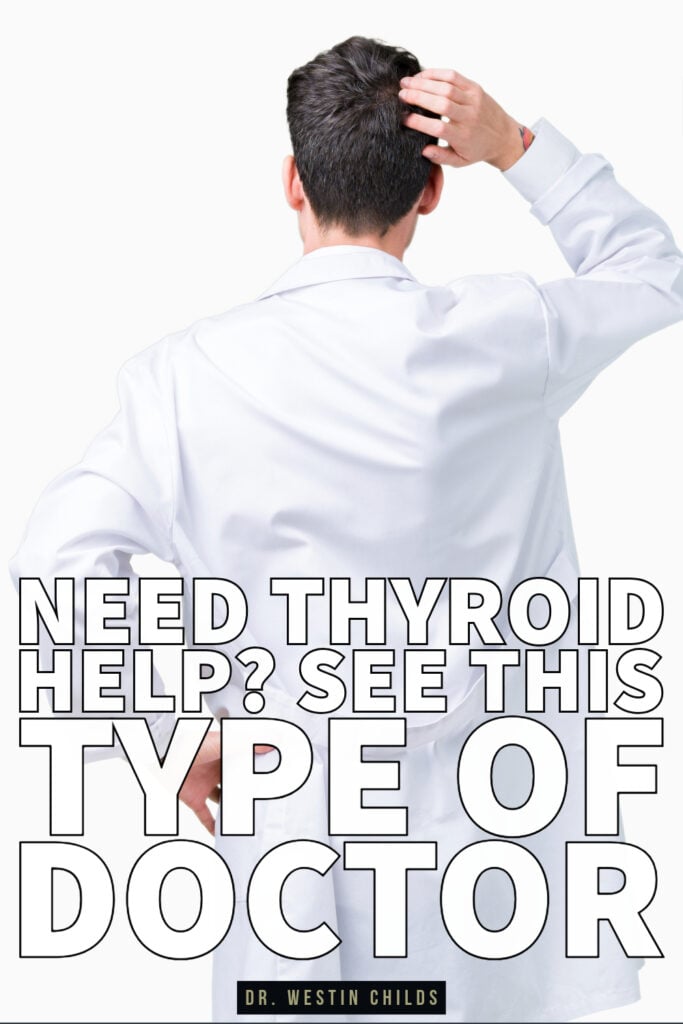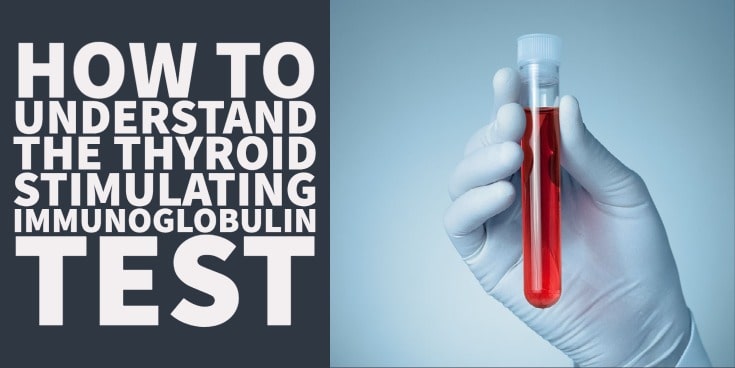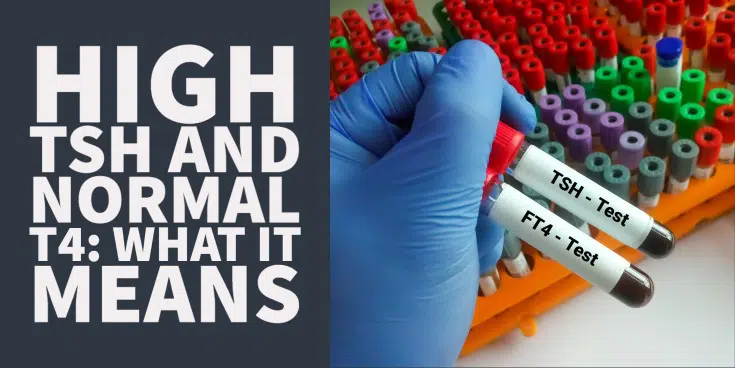If you have any thyroid condition then you know just how frustrating it can be trying to get your doctor to see eye to eye with you.
While doctors have undergone training to help people with various types of problems, it isn’t always the case that whatever doctor you are seeing is the best option for you.
And, as a thyroid patient, you may not be aware that there are MANY options available to you.
You don’t have to stick with your primary care doctor or your endocrinologist, especially if they don’t seem to be helping you.
There are doctors who specialize in other areas of medicine that are often better at treating hormone imbalances such as thyroid problems.
So if your doctor really isn’t willing to work with you or isn’t interested in hearing about your problems, you do NOT need to settle.
But before you run out and swap doctors, let’s take a look at the various options available.
In this article you will learn:
- How conventional doctors differ from integrative doctors
- How various types of doctors can help treat and manage thyroid problems
- Why some doctors are better at managing thyroid problems compared to others
- When you should look outside of the traditional insurance-based model
- How naturopaths, chiropractors, and health coaches can help you feel better
- And much more
Let’s jump in…
Traditional and Conventional Doctors That You Can See
By traditional doctors, I am really referring to the standard type of doctor that most of you are familiar with.
These are doctors who are conventionally trained and consist of both MDs and DOs (1).
These doctors have gone to medical school and completed residency and are usually board-certified in a specific area of practice.
They have gone through at least 4 years of college, 4 years of medical school, and anywhere from 3-4 years of residency after medical school.
Unfortunately, being board certified and having completed residency does not guarantee that they are the “best”, though.
The good part about standardized medicine is that you can expect a certain degree of competence among all types of physicians.
The bad part about standardized medicine is that this competence is pretty much the same regardless of what type of doctor you see.
These types of doctors rarely think “outside” of the box and stick to the rigid guidelines provided by boards and governing medical bodies.
Again, this isn’t necessarily a bad thing if you are someone who fits the stock standard mold of thyroid management.
But what if you are someone who doesn’t respond to conventional medications like levothyroxine or Synthroid?
What if you are someone who has abnormal reactions to medications or presents with abnormal symptoms?
What if you are someone who prefers to take a more natural approach to managing your thyroid?
If so, then these are typically not the best doctors for you.
They all typically tend to treat the same way and this treatment includes evaluation with the TSH and the use of stock standard thyroid medication like levothyroxine.
Having said that, they aren’t all, and some may work well for you.
In addition, it may be required to see these types of doctors depending on the type of thyroid disease that you have.
With that in mind, let’s dive a bit deeper into each of these types of doctors:
Family Practice Doctors or Primary Care Physicians
The first on the list are family practice doctors.
This is the doctor you go to when you are sick or when you need to manage medications or when you need a yearly check-up, and so on.
They don’t receive any specialized training in managing thyroid conditions but they are often not afraid to manage low to moderately complex thyroid conditions and patients.
One downside to seeing a primary care physician is that their ability and familiarity with thyroid management can vary from doctor to doctor.
Some family practice doctors may be perfectly comfortable managing Hashimoto’s thyroiditis and hypothyroidism whereas others may want to hand you off to an endocrinologist.
For the most part, most primary care providers are not interested in managing thyroid patients, but there are some who take a special interest in it.
These doctors usually have advanced training in hormone management, the use of diet in managing disease, the use of supplements, and additional thyroid lab tests.
Whenever possible, seek out this type of primary care provider!
You can differentiate between a standard primary care physician and one who is more holistic in their approach just based on what type of treatments they recommend and use.
If your doctor insists upon only using levothyroxine and testing your TSH, then they are conventionally minded.
If your doctor is open to ordering more than just the TSH and to using additional thyroid medications such as T3 medications and NDT, then they are more holistic in their approach.
It should come as no surprise that thyroid patients who take a more holistic approach to managing their thyroid often have much better results compared to those who don’t!
After all, it makes perfect sense.
Who wouldn’t want personalized recommendations on diet, exercise routines, supplements, thyroid medication management, and more?
These types of doctors are few and far between and usually in high demand (for good reason).
Endocrinologists
Endocrinologists are considered the “specialists” when it comes to thyroid management.
These doctors go to residency to specifically learn about hormones and hormone management!
At first glance, you are probably already giddy with excitement because it sounds like they are the PERFECT doctor to treat and manage thyroid patients.
And while it may sound like that, it’s nowhere near as good as it sounds.
There is no disputing the fact that endocrinologists have more knowledge and experience than primary care physicians when it comes to thyroid management.

But this experience doesn’t necessarily equate to better outcomes among thyroid patients.
Endocrinologists, like many primary care physicians, tend to focus only on the TSH as a way to measure thyroid problems and levothyroxine as a tool to treat thyroid conditions.
This myopic approach to thyroid management leads many thyroid patients to suffer from symptoms such as weight gain, depression, and fatigue.
Furthermore, their additional years of training tend to make them more set in their ways and less likely to hear patients who are feeling poorly.
Has this happened to you? If so, let me know in the comments below!
I’ve heard countless stories of thyroid patients who get fired by their endocrinologists because they asked for additional thyroid lab tests or because they wanted to try a different thyroid medication.
All of those additional years of training are wasted if they are unwilling to actually listen and try new treatments.
Not all endocrinologists are this way, though.
Some endocrinologists recognize the plight of thyroid patients and are open to using additional thyroid medications such as liothyronine and Cytomel.
These endocrinologists recognize that there is no one-size-fits-all to thyroid management and that certain thyroid patients will need different treatments from others.
As a percentage, endos who think this way are a minority.
If your endocrinologist is unwilling to work with you or even listen to your symptoms then you may have better luck with a more holistic type of doctor or with your primary care physician.
It may sound like I am being overly critical of endocrinologists based on what you are reading here.
I’ve even had people/patients/doctors get upset at me for taking the approach that I do.
So let me be clear:
Endocrinologists DO have a place in managing certain conditions, especially those conditions that are potentially life-threatening.
Where they fail, I believe, is in managing thyroid patients who do not fit the standard treatment mold.
If you are someone who will do well on just levothyroxine then an endocrinologist is perfect for you.
But that’s not most people and that’s probably not you if you are reading this.
With that in mind, let’s give credit where credit is due…
Sometimes endocrinologists are needed, especially if you have any of the following conditions:
- Thyroid storm
- Hyperthyroidism
- Complications from Graves’ disease such as Graves’ eye disease
- Thyroid cancer
- Large goiters or thyroid nodules
- Follow-up and monitoring of thyroid nodules
- Head and neck cancers requiring radiation
- Genetic thyroid abnormalities
- Thyroid medication management in cases where you can’t find another doctor to prescribe what you need
It’s great to use an endocrinologist for any of the above reasons but remember that the recommendations you receive from your endo will be limited to only medications and/or surgical operations.
You can use an endocrinologist to get your thyroid medication but it would also be wise to use someone like a health coach or naturopath for additional lifestyle recommendations.
General Surgeons
Believe it or not, surgeons actually play a role in thyroid disease and thyroid management.
This role is typically isolated to surgical operations including thyroid removal and biopsies but it sometimes extends to thyroid medication management as well.
You generally do not want to see a surgeon for your thyroid unless you need it to be surgically removed due to thyroid cancer, hyperthyroidism, or excessively large thyroid nodules.
There are some surgeons who manage thyroid patients with thyroid medication, especially in smaller towns/cities.
Oncologists
Oncologists are doctors who specialize in the treatment and management of various types of cancers.
Usually, thyroid patients don’t have to spend much time with oncologists because thyroid cancer is usually “cured” with complete thyroid removal and RAI.
Ob/Gyn
Ob/gyn physicians can actually be great doctors to help manage your thyroid!
Because thyroid problems can lead to issues such as infertility and menstrual irregularities, these doctors are sometimes the first to diagnose thyroid conditions.
In addition, many of these doctors understand that it’s very difficult to get pregnant if the thyroid isn’t optimized!
Because of this, they understand and appreciate the role that T3 thyroid medications play in helping patients get pregnant and feel better.
You may have better luck seeing an ob/gyn compared to an endocrinologist for this reason!
Not all ob/gyns are interested in treating thyroid patients, though.
Remember:
Their specialty is in obstetrics and gynecology and not necessarily thyroid management.
So your mileage may vary here.
Alternative and Holistic Doctors (My Preference)
This is where things get interesting:
Now we are going to discuss a different set of doctors that are considered alternative, integrative, or holistic.
These are doctors (usually) who take a much more holistic approach to medicine and thyroid management.
They have gone through 4 years of medical school and 3-4 years of residency like other physicians but these doctors have gone through additional training afterward.
This training can vary in length but is usually at least an additional 2 years on top of their residency program.
They still understand the importance of thyroid hormones, medications, and physiology but they combine this information with holistic treatments such as dietary changes, exercise, stress reduction, the use of supplements, the importance of sleep, and so on.
I’m biased because this is how I used to practice so take that with a grain of salt.
But intuitively, it shouldn’t come as a surprise that these types of doctors provide much better care than the standard doctors.
On average, they tend to spend MORE time with patients and provide additional lifestyle recommendations compared to conventional doctors.
While there are many pros to seeing this type of doctor there are also some cons and I will make mention of those when appropriate.
Doctors who specialize in Integrative and Functional Medicine
Integrative medicine (2) and Functional Medicine (3) are areas of medicine that can be learned AFTER residency.
This is important because it means that any doctor who specializes in this area already has knowledge of how the conventional medical system works.
They know the ins and outs of conventional medicine, how thyroid patients are managed, and so on.
This gives these doctors unique insight because the opposite is not true for the standard endocrinologist or family practice doctor.
I’m able to discuss how regular doctors treat thyroid patients so well because that’s exactly how I was trained.
But an endocrinologist has no idea how to use thyroid supplements, how diet impacts thyroid function, why fasting can help thyroid patients lose weight, and so on.
Naturally, this provides you with comprehensive thyroid care.
Doctors with training in integrative and functional medicine can take care of your thyroid and provide a prescription for your thyroid medication (if necessary) in addition to recommendations in other areas of your lifestyle and life.
Whenever possible, I highly recommend looking for a physician with this type of training.
Below I’ve included some resources to help you do just that.
Doctors who Specialize in Anti-Aging Medicine & Hormone Balance
Doctors who specialize in anti-aging medicine (4) and hormone balance can also be a great option for thyroid patients.
These doctors undergo additional training after residency just like those who specialize in integrative and functional medicine.
Doctors in this category still have their conventional medical training but are still able to provide lifestyle treatment recommendations.
These doctors are also typically not afraid to use medications off-label, to prescribe other bio-identical hormones, and to use newer therapies and treatments.
Naturopaths
Depending on where you live, Naturopaths can also be a great option for managing your thyroid!
Naturopaths can prescribe thyroid medication in many states which makes them an ideal treatment partner for thyroid patients.
Naturopaths are doctors of naturopathic medicine and have undergone 4 years of medical school at a naturopathic medical school.
Some naturopaths also undergo additional training after naturopathic medical school similar to that of a residency by MDs and DOs.
Naturopaths have a natural inclination towards holistic therapies and they can receive training in conventional medical practices as well.
Some patients prefer to see Naturopaths over conventional doctors and even consider them their primary care physicians where they get care ranging from pap smears to blood pressure medication and everything in between.
How a Naturopath can help you largely depends on whether or not they are licensed to prescribe medications.
If you are in a state which allows them to prescribe thyroid medication then they could be used in place of your primary care provider or even endocrinologist.
If you are not, then they can still take on a role in helping to improve thyroid function through dietary changes, supplements, herbs, lifestyle changes, and so on.
I’m a big fan of Naturopaths and highly recommend them if you can find one locally, even better if you live in a state where they are able to prescribe medications.
Chiropractors
Most people think of Chiropractors as doctors who specialize in the neck and back.
And while this is true, there are many chiropractors who do just that, there are many who focus and specialize in different areas of medicine.
Some chiropractors devote their entire practice to treating just one single condition whether that is hormone imbalances, neurological issues, PTSD, or whatever.
These chiropractors can become very skilled at helping people with certain conditions.
In addition, chiropractors do have additional knowledge of the physical body and how the physical body can impact disease states.
Chiropractors are considered doctors of chiropractic medicine and they go to chiropractic medical school for 4 years.
Unfortunately, they do not have the ability to prescribe medications at this time so they will not be able to prescribe thyroid medication if you need it.
They can still, however, provide lifestyle recommendations and can provide treatment recommendations that complement medications you may be taking from an endo or primary care physician.
Health Coaches
Lastly, you also have the option to use a health coach.
I used to work hand in hand with a health coach who was invaluable in helping my patients feel better.
This health coach would help put into practice the treatments and therapies that I would recommend.
She would help patients find barriers to implementing my dietary recommendations and help bust through those barriers so that our patients could feel better.
It’s actually quite easy for me to make all sorts of lifestyle recommendations to thyroid patients.
Things like…
The type of diet you should be eating, what supplements you should take, how many hours you should sleep, how frequently you should meditate, and so on.
The hard part is the actual implementation of these recommendations and that’s where health coaches step in.
They can help you figure out if you are self-sabotaging, how to implement specific strategies with tips and tricks, and much more.
This is the best way, in my opinion, to use a health coach. In concert with a knowledgeable physician who specializes in thyroid management.
If that isn’t an option then you can see your primary care physician or endocrinologist and then see a health coach on the side.
Insurance vs Cash Pay
You should be aware that many of the “best” doctors typically do not accept insurance for their services.
This can be a frustrating thing to hear for many patients but that is the reality of the situation right now.
The reason is simple:
Insurance usually compensates doctors based on complexity and time. In order to get the most out of that time, doctors need to see a huge number of patients every single day.
To meet the demands of staff and salary this usually means no more than 5-10 minutes per patient per day.
It’s just simply not possible to have a meaningful conversation about eating habits, exercise routines, how someone is feeling, and diving deep into a complex medical history in that timeframe.
But you certainly can look at the TSH and adjust thyroid medication as necessary in 5-10 minutes.
So guess what happens?
Doctors lean towards quick visits with minor adjustments to thyroid medication and neglect the other more important areas mentioned above.
Doctors who break free of the insurance reimbursement model can spend much more time with thyroid patients.
When I was practicing, my initial visit was 60 minutes and every follow-up visit was 30 minutes. I also ensured that I didn’t overload my total patient list so that I could spend enough time with each of my patients.
And this isn’t uncommon! Other practitioners spend up to 90 minutes or more on initial visits so they can really understand their patients.
This method provides much better results compared to the standard model but it comes at a price.
Most practitioners who practice this way do not accept insurance which means you may need to pay out of pocket.
Fees for doctors can range anywhere from $150 to $300 an hour or more, depending on the skills and notoriety of the doctor.
Is it possible to find a great doctor and have insurance cover it?
Yes, it definitely is still possible. It’s much more difficult but still possible.
So if the prices I’ve listed above cause sticker shock then you will need to spend some time searching for the conventionally trained doctors that take insurance first.
Tips To Help You Find a Knowledgeable Doctor
Now that you have an idea of what types of doctors are available and how they all differ in their approach, let’s talk about some specific actions you can take to FIND the right doctor for you.
Here are some tips you can utilize:
- Call a local compounding pharmacy and see if you can get a list of names of doctors that have prescribed sustained release T3 or compounded T4 and T3 thyroid medications in the past – If a doctor is willing to prescribe these medications then there is a good chance that they will take a unique approach to manage your thyroid problem. It also implies that they have more knowledge than standard doctors because they are using a compounding pharmacy which conventional doctors typically don’t use or are even aware of.
- Call the office of the doctor BEFORE you schedule an appointment to get some information about how that doctor treats thyroid patients – Ask questions like, is this doctor open to ordering additional lab tests? is this doctor open to using additional thyroid medications beyond levothyroxine or Synthroid? and whether or not this doctor is open to using supplements to help treat thyroid problems.
- Check the ratings of the doctor to see what kind of experience other patients have had – Don’t live and die by these ratings, though, as many times the ratings are manipulated or adjusted by the companies that control them. Many places push down negative reviews and push up positive reviews if a fee is paid. Having said that, you can still get an overall feel for the doctor you are interested in seeing.
- Use free doctor directories from holistic training centers – There are additional programs and training courses that help educate doctors on how to use holistic therapies such as bioidentical hormones, supplements, diet, etc. Some of the most notable include the Institute for Functional Medicine and the Andrew Weil Center for Integrative Medicine.
- Ask for referrals in thyroid support Facebook groups – I’ll be the first to admit I’m not a huge fan of Facebook groups because they can be a large source of misinformation but in this area, they can excel. If you are a part of any Facebook thyroid support groups then drop a question in that group to see if anyone has recommendations for a local doctor. You may not find the perfect fit but you might get something better than what you currently have!
- Contact advanced laboratory testing centers and ask for a list of doctors that use these tests in your state – There are many laboratories that provide specialized tests for certain hormones. One such company is Precision Analytical Inc. This particular lab testing company provides a DUTCH test that can be used to assess cortisol as well as other sex hormones. You can contact these companies and ask if they know any local doctors who use their tests. If they do, the chances are high that they have more advanced knowledge of hormone management. Precision Analytical actually has a search function that you can use. This is just one example, though, as there are many other lab testing companies that you can contact.
- Look for doctors who write blog posts, host podcasts, or create YouTube videos – Before you see a doctor make sure you check their website to see if they have any additional information or content that you can look at. If they have this type of information you can really get a feel for how they might practice before you spend time, energy, and money with them. Unfortunately, this doesn’t always work, though, because doctors who are more well-known are usually not accepting new patients. But if you can find someone early and before they become well known then you are in luck!
- Look for doctors that specialize in anti-aging medicine, bio-identical hormone therapy, integrative medicine, functional medicine, or personalized medicine – These specialties are not residencies but they require additional education after residency for certification. If a doctor has spent additional money and time learning in these areas then you can bet that they are more knowledgeable than your standard doctor. This training isn’t required, though, so you may find that some doctors have taken only a few courses here and there. I was never formally certified in Functional Medicine, for instance, so I wouldn’t show up on their directories but I did practice in keeping with their philosophies. You may be able to find others who fit into the same boat!
- Get referrals from local health coaches or chiropractors – Lastly, if you are already being treated by a holistic practitioner such as a chiropractor or a health coach then you can use them as a resource. These practitioners see a lot of patients and often have a wider network that they can tap into to give you an idea of what their other clients are doing! The only downside here is that you probably need to have a relationship with them first in order to get that type of information.
When to Seek Out a Second Opinion
What if you are already working with a doctor and you aren’t sure what to do next?
I realize that it’s not always as easy as just finding a new doctor.
Looking for a new doctor takes a lot of work, it often requires extra time and energy and may be quite expensive.
Because this task can be daunting, many thyroid patients are reluctant to do it!
I totally understand that perspective but let me ask you a few questions.
These questions should help you decide if your current doctor is worth sticking with or if it’s time to try someone else:
Has your current doctor helped you to feel better in any way?
Does your current doctor actually listen to you?
Does your current doctor take your symptoms seriously?
Does your doctor dismiss your symptoms or suggest that they are in your head or due to depression or aging?
Does your current doctor look at more than just your lab tests?
Does your current doctor support you in seeking out additional information on the internet or from other sources?
Does your current doctor support you if you want to take a natural approach to managing your thyroid?
Does your current doctor support the use of thyroid support supplements?
Does your doctor actually know and remember who you are? Are you more than just a chart or a number on a computer screen?
Is your doctor willing to look at new research and change their beliefs based on evidence?
Does your doctor tell you when they don’t know the answer to something or does he/she always seem to have an absolute answer to every question?
Would you be happy feeling how you feel now for the rest of your life knowing that you may be able to feel better if you used a different doctor?
Before you do anything, take some time to reflect on these questions.
What I want you to know is that it is possible for thyroid patients to feel better, to have normal energy levels, to lose weight, and to feel like they did before their thyroid diagnosis.
Wrapping it Up
There are many different specialists available to you as a thyroid patient and it is a good idea to at least be familiar with all of them!
You will find that each type of doctor or practitioner is slightly different in their approach to thyroid management and this variety in treatment management is often ideal for thyroid patients.
Why?
Because you might be someone who can potentially reverse your thyroid condition with the right changes to your diet or if you use the right supplements.
In this case, a naturopath or health coach may be ideal for you.
On the other hand, you might be someone with a severe case of Hashimoto’s that requires higher-than-normal doses of thyroid medication.
In this case, an endocrinologist might be the best option for you.
And lastly, maybe you are someone who has a complicated medical history with multiple chronic medical conditions and wants to get as close to 100% as possible.
In this case, you would probably benefit from a team of practitioners including a functional medicine doctor, a health coach, and a chiropractor.
You can see how each thyroid patient is unique and the approach that that person needs will be different from the next.
As a thyroid patient, don’t be afraid to “shop” around for a doctor who works FOR you and not against you.
Remember:
You are the one who has to live your life. If you are living your life with fatigue, weight gain, and other thyroid symptoms because your doctor refuses to work with you, you are the one who is suffering.
Now I want to hear from you:
Have you tried working with other doctors beyond your primary care or endocrinologist?
Is your doctor actually willing to work with you?
Have you had success in using naturopaths or chiropractors?
Have you used a health coach in concert with your current physician?
Leave your questions or comments below!
Scientific References
#1. https://www.sgu.edu/blog/medical/md-versus-do/
#2. https://www.mayoclinic.org/tests-procedures/complementary-alternative-medicine/about/pac-20393581
#3. https://www.ifm.org/functional-medicine/what-is-functional-medicine/
#4. http://www.faafm.com/what_is_anti_aging_medicine.html









